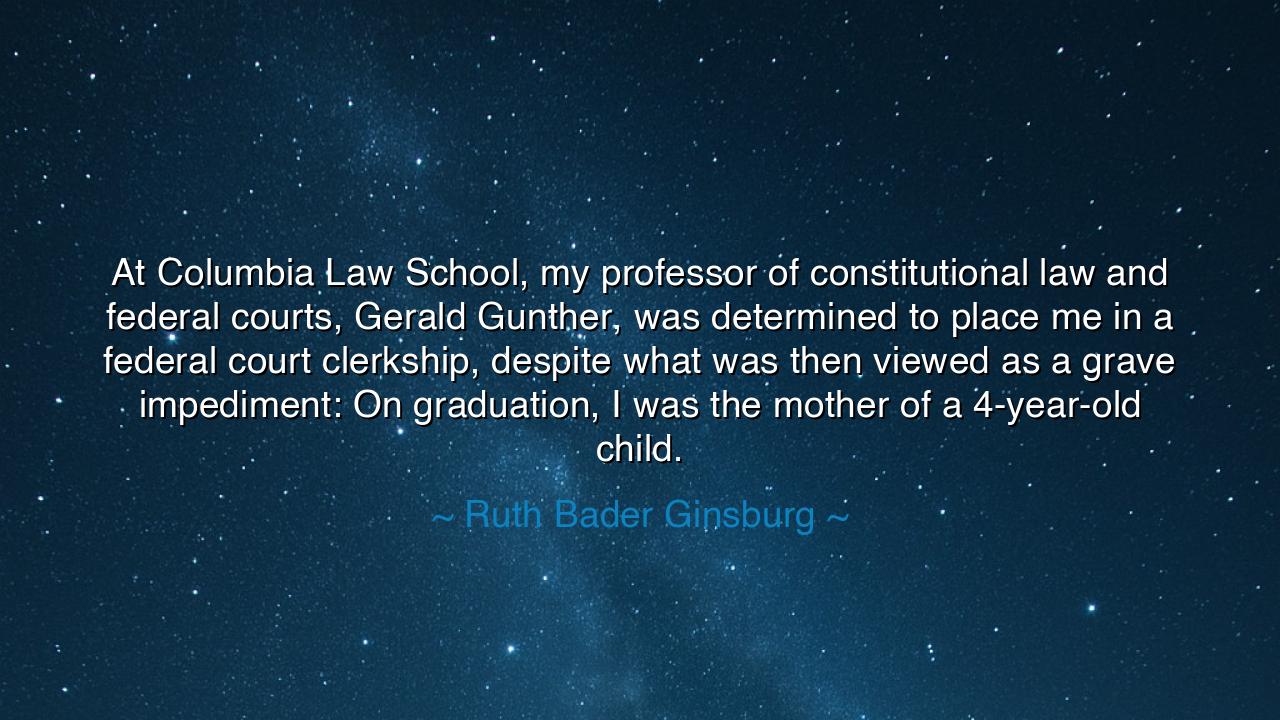
At Columbia Law School, my professor of constitutional law and
At Columbia Law School, my professor of constitutional law and federal courts, Gerald Gunther, was determined to place me in a federal court clerkship, despite what was then viewed as a grave impediment: On graduation, I was the mother of a 4-year-old child.






In the profoundly human words, “At Columbia Law School, my professor of constitutional law and federal courts, Gerald Gunther, was determined to place me in a federal court clerkship, despite what was then viewed as a grave impediment: On graduation, I was the mother of a 4-year-old child,” Ruth Bader Ginsburg speaks with quiet fire of the obstacles that once defined a woman’s world — and of the rare allies who dared to see beyond them. Beneath her calm recollection lies a story of faith, defiance, and transformation — the courage of a woman who refused to let motherhood or prejudice define the limits of her destiny, and the compassion of a mentor who recognized that talent knows no gender. It is the story of how justice begins not only in courts, but in hearts that choose to see with fairness and courage.
The origin of this quote reaches back to the 1950s, when Ginsburg, a young law student at Columbia University, stood at the crossroads of brilliance and bias. In those days, the legal profession was a fortress guarded by custom — its gatekeepers convinced that women, especially mothers, lacked the endurance or intellect for its rigorous life. But in Professor Gerald Gunther, she found not merely an instructor, but an advocate of vision, a man who understood that equality was not a theory to be taught, but a truth to be practiced. When others saw a “grave impediment,” Gunther saw only promise. His determination to secure her clerkship was an act of rebellion — not loud or theatrical, but moral and resolute, the kind of rebellion that shifts history one decision at a time.
What Ginsburg endured, and what Gunther challenged, reveals the ancient struggle between bias and merit, a conflict older than civilization itself. In every age, progress has been delayed not by ignorance alone, but by prejudice — the belief that one’s birth, not one’s deeds, defines one’s worth. The Greeks once told of Athena, goddess of wisdom and war, born from the head of Zeus, fully armed, symbolizing intellect made manifest in female form. Yet even in myth, such a birth was an exception, not a norm. The world has long revered wisdom in principle, but distrusted it in women. Ginsburg’s path through Columbia, balancing the demands of motherhood and scholarship, was a modern echo of Athena’s emergence — intellect forged through trial, adorned with discipline and grace.
Her professor’s faith in her was not a simple favor, but an act of justice that revealed the power of mentorship. For the ancients, the mentor was sacred — a guide who helps the soul remember what it is capable of becoming. Gunther did not give Ginsburg her power; he reminded her of it and created space for it to be recognized. His courage to defy convention became the bridge that connected one woman’s talent to a world that had not yet learned to value it. Through this act, he became part of a lineage that stretches back to every teacher, general, and philosopher who chose truth over comfort — those who saw what could be rather than what was.
Ginsburg herself would one day repay that faith a hundredfold. The young mother once considered a liability became one of the greatest champions of equality in history, reshaping the law of her nation and the conscience of her time. She stood before the Supreme Court not as an exception, but as a herald of what the world could become when justice is guided by empathy. Her victory was not only for women, but for all who have been told they must choose between their responsibilities and their dreams. Her life proclaimed that motherhood does not diminish intellect, that compassion and rigor can coexist, and that true excellence rises — quietly but unyieldingly — through the weight of every doubt placed upon it.
The lesson within her reflection is eternal: never let the world’s narrow vision dictate the scope of your destiny. Obstacles are not measures of worth, but tests of will. To be underestimated is not misfortune, but fuel. And to support another — as Gunther supported Ginsburg — is to become an architect of history. The teacher who believes, the friend who advocates, the leader who opens a door — these are the unseen heroes who keep civilization moving forward, even when progress seems slow.
The practical action is twofold. If you are one who climbs, climb not in silence — remember those who lent you their strength, and lift others as you ascend. If you are one who teaches or leads, see beyond appearances; the next Ginsburg may stand before you, uncertain but ablaze with potential. Be the voice that says, “You can,” when the world insists, “You cannot.” For as Ruth Bader Ginsburg and her mentor once proved, one act of faith can alter the destiny of generations — and from such acts are born the quiet revolutions that change the course of justice, and the soul of humanity itself.






AAdministratorAdministrator
Welcome, honored guests. Please leave a comment, we will respond soon